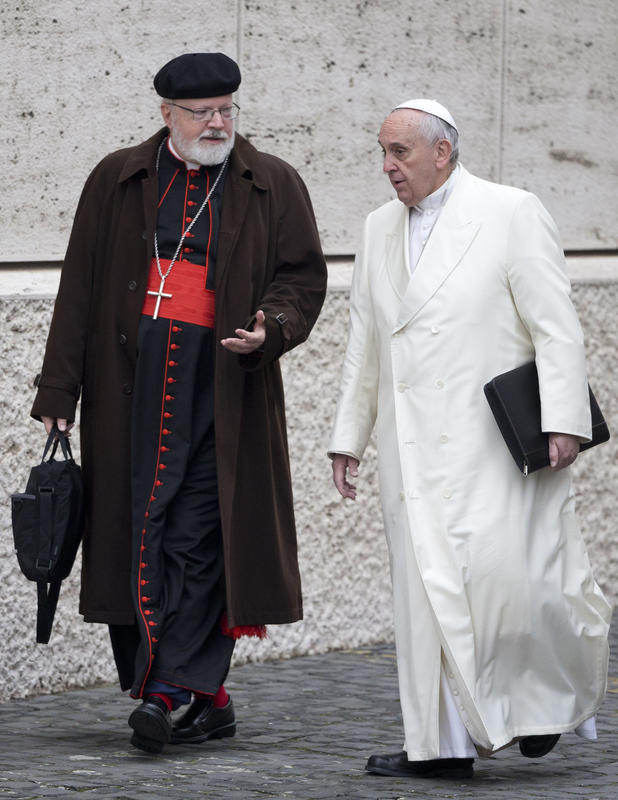
A CONTROVERSIAL Catholic priest has claimed the vow of celibacy is one of the causes of clerical child abuse and called on the church to repeal the ancient law.
Father Tony Flannery will deliver a lecture at the University of Edinburgh next month entitled “Celibacy, sexuality and the crisis in the priesthood” when he will also demand the ordination of women.
The Catholic Church forbids women from joining the priesthood and men who are ordained must promise not to have sex, a rule which Flannery claims is deterring young men.
The Catholic Church has distanced itself from Flannery, denied that the celibacy rule was off-putting and said there were 12 priests ordained in Scotland last year, the highest number in 20 years.
Flannery was suspended by the church in 2012 and threatened with ex-communication unless he stayed silent, but he is set to bring his message to Scotland on February 28 and risk further sanctions by the church.
Speaking exclusively to the Sunday Herald, he said: “The rule on celibacy has to be changed because it is not working. Fewer and fewer young men are interested in becoming priests because the oath of celibacy is a big deterrent.
“Catholic priests could marry up until the 13th century. It’s purely a church regulation and as such it can be changed.
“In my experience, for a lot of priests, celibacy has been a struggle which can lead to difficulties, such as addictive behaviours.”
Flannery went on to say celibacy can be “a factor” in clerical child abuse cases. “It’s something that should be examined carefully by the Catholic church,” he said.
“The Australian investigation into child sexual abuse in institutions, in the final summing up which came out a month ago, suggests compulsory celibacy was a factor. One of the recommendations they made was the Catholic church lift the rule on compulsory celibacy.”
Flannery, who lives in Killimordaly in County Galway, was ordained more than 40 years ago and took the vow of celibacy, but he would not confirm whether he had adhered to the rule. “I have many relationships, but I don’t want to go into my personal life,” he said. “One thing I will say is I am a 71-year-old man so…”
Flannery also wants to see an end to the patriarchy which governs the church and decrees that women can’t be priests.
“I am fully supportive of the ordination of women,” he said. “I want women to have full equality in the church. At the moment women have no voice in decision-making in the church. That is so wrong and outdated that it has to change. I see women as essential for the credibility of the Catholic church going forward.”
A spokesman for the Catholic church said: “Ordination and decision-making are completely different things – the former is not a pre-requisite for the latter.”
When asked about celibacy the church spokesman added: “To suggest celibacy is a deterrent to vocations is demonstrably not true…in Scotland the number of men studying for the priesthood has increased every year for the last 10 years. In 2017 there were 12 ordinations of priests in Scotland, the highest figure in 20 years. There are currently 18 seminarians studying for the priesthood, the highest figure for over a decade.”
Flannery’s views led to sanctions by the church’s Congregation for the Doctrine of the Faith, which was founded in 1542 to defend the church from heresy.
Flannery said: “I am no longer allowed to minister publicly as a priest. That happened six years ago. As a consequence, I have been on the fringes of the church. It’s affected my opinion of the Vatican.
“My main dispute there wasn’t so much that they objected to things I had written. I don’t mind that. The authority structure has the right to question people. My main problem was the process in which the Vatican dealt with me was totally unjust.
“I had no opportunity to defend myself. I was never told who accused me or the nature of the allegation. I was never communicated with directly by the Vatican. There was no court of appeal.”
A church spokesman said: “The Vatican processes are far from unjust and ensure the right of defence for all involved.”
FLANNERY COULD FACE PROTESTS BY CATHOLIC STUDENTS AT EDINBURGH UNIVERSITY
Diego Maria Malara, a lecturer in social anthropology, is organising Flannery’s visit and expects opposition. He said: “Father Flannery’s scheduled appearance at the University in February will be boycotted by more conservative members of the Catholic Student Union, but many of Edinburgh’s Catholics will welcome the chance to hear this charismatic speaker, who represents the progressive side of the Catholic Church.”
Maya Mayblin, who is also a lecturer in social anthropology, invited Flannery to speak. She is researching how sexuality affects the lives of Catholic priests.
She said: “Father Flannery is one of relatively few people within the church to have addressed this issue directly and publicly, so I think people will be very interested in what he has to say. I haven’t encountered any opposition and my hope is that even those who disagree him will want to attend his talk.
“Father Flannery is an important figure because he’s in a position to give voice to opinions which lots of priests hold, but are unable to express due to something of a culture of silence within the priesthood.
“The church is a very centralised institution, so any divergent voice, especially from a priest, can seem troubling to the institution.”
The Sunday Herald contacted the University of Edinburgh’s Catholic Students’ Union for comment, but did not receive a response.
Flannery said: “If they turn up with placards and try to interrupt me I would find it hilarious.”
Complete Article ↪HERE↩!



